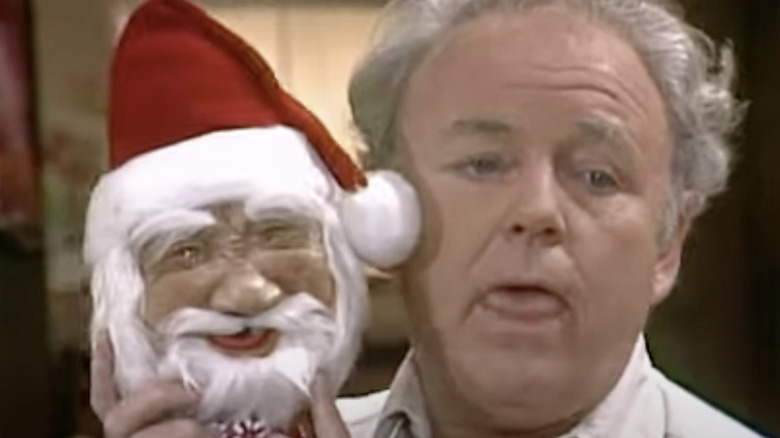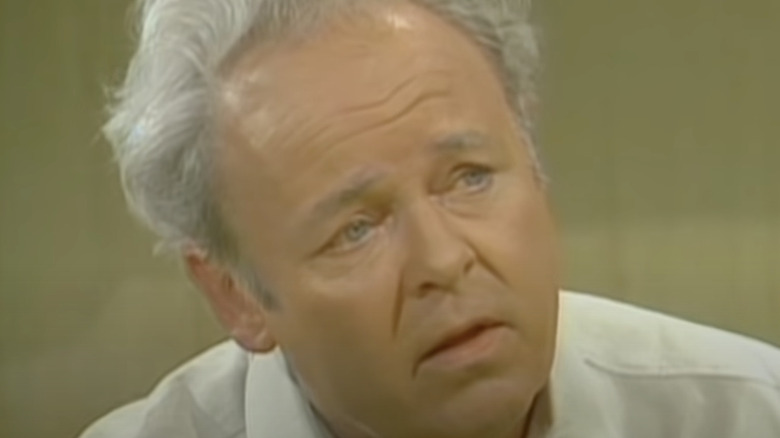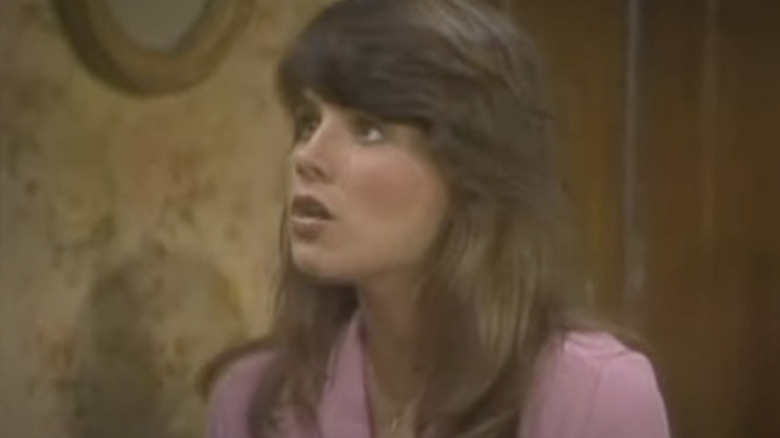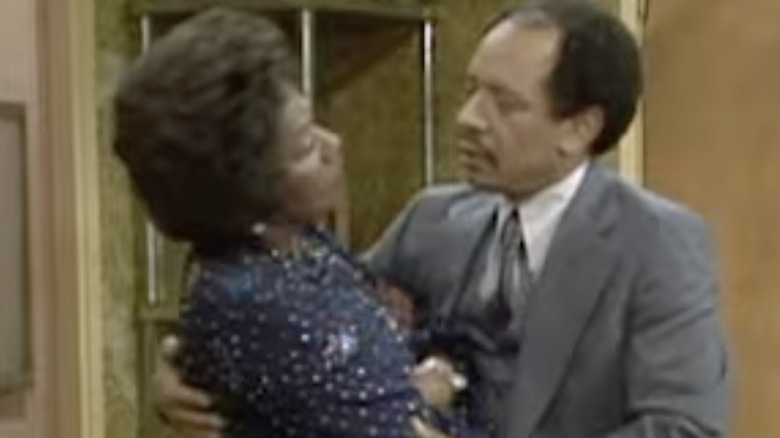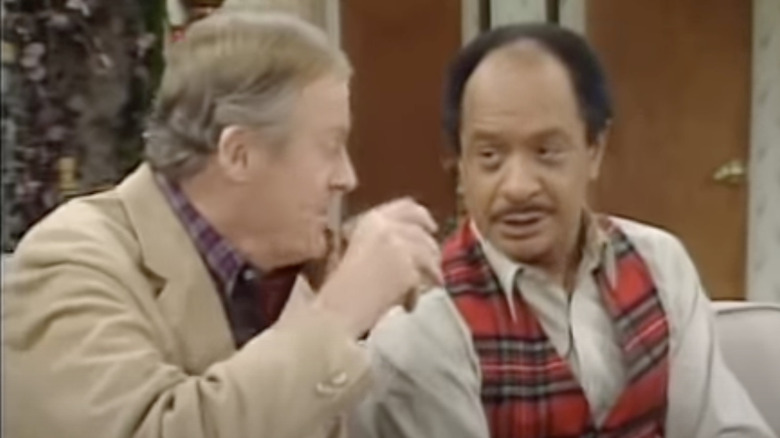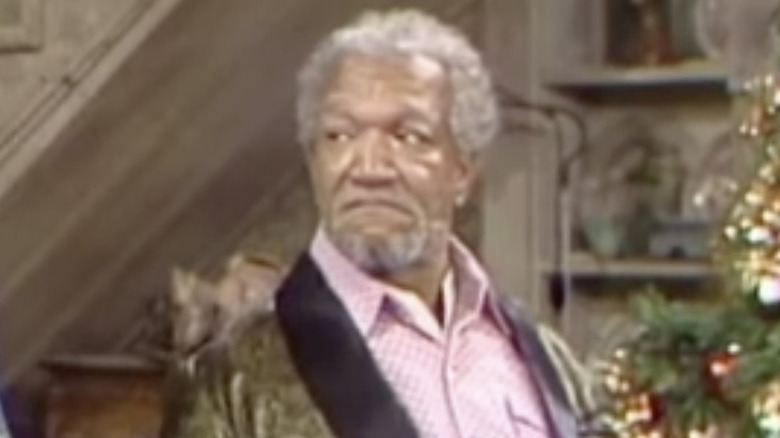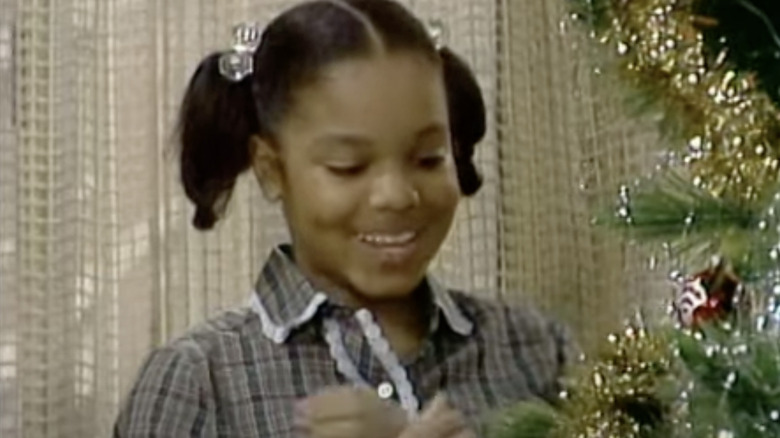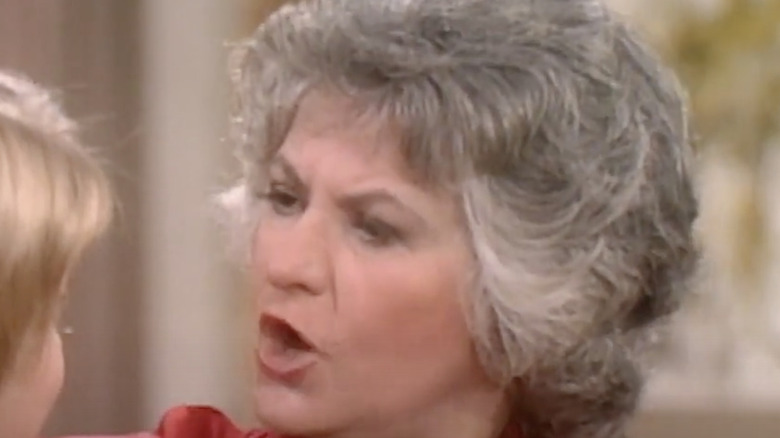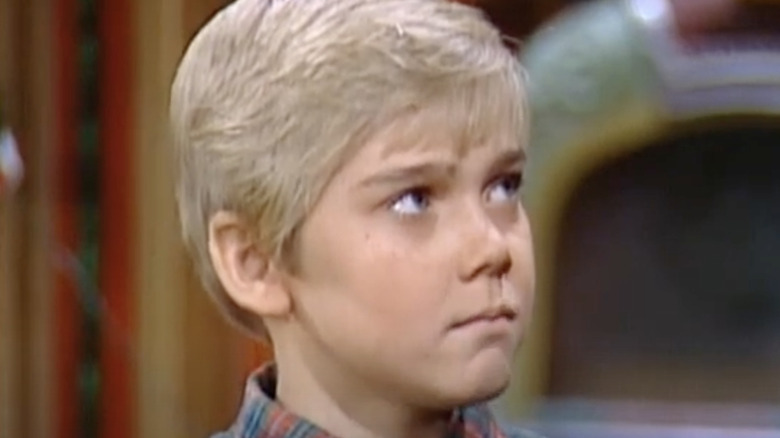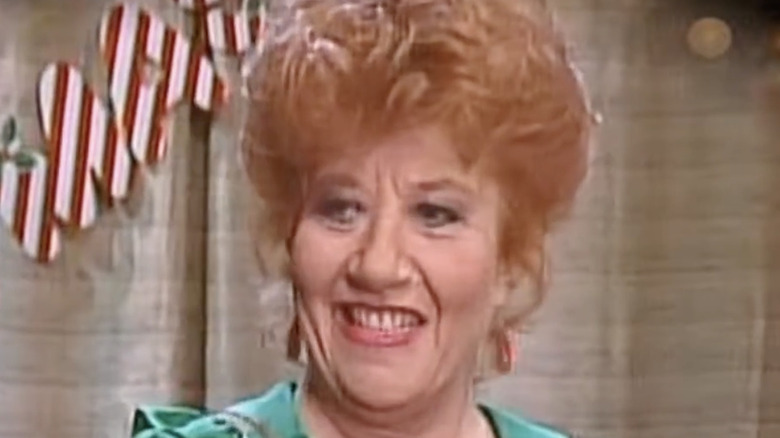Moments That Will Put You In The Holiday Spirit
This content was paid for by Sony and created by Looper.
The comedies created, produced, or shepherded by TV mastermind Norman Lear reinvented the sitcom format in the 1970s and 1980s. Their combination of frank and respectful discussions of social issues with memorable, flawed characters and relatable situations led to some of the most captivating and popular television shows of all time, giants of the sitcom format that are still widely praised today. Among the series for which Lear is responsible: "All in the Family," "The Jeffersons," "Maude," "Good Times," "The Facts of Life," "Silver Spoons," and "One Day at a Time."
Lear's shows — which more often than not, felt like stage plays beamed into millions of homes week after week — were always funny, brave, and vital. But they saved some of their most profound and emotionally affecting plots for their annual Christmas episodes. This subset of sitcoms made viewers laugh, think, and feel, and their holiday installments left an indelible impression with their sweetness and unabashed humanity. Here are the episodes of classic Lear shows that will no doubt provoke an awakening of the holiday spirit.
When Archie Bunker grappled with war during Christmastime
"All in the Family" was a 1970s cultural phenomenon, and that's due to show mirroring the tenor of what was likely occurring in millions of American homes. Carroll O'Connor played Archie Bunker, a loudmouthed, embittered bigot and veteran who absolutely loathed the younger, hippie, countercultural, anti-Vietnam War generation — leading to palpable tension and screaming debates when his adult daughter Gloria falls in love with a Peacenik named Mike Stivic (but whom Archie non-affectionately calls "Meathead"). Over the course of the "All in the Family" series run, Archie slowly becomes kinder and more understanding, and a landmark moment in his character's development — and in the series itself — is the Season Seven episode "The Draft Dodger."
Archie invites his old friend Pinky Peterson to Christmas dinner, advising his family not to mention his guest's son, Steven, who had just died in combat in Vietnam. Mike brings along his friend, David, who reveals himself to be a draft dodger, hanging out in Canada because he refuses to join the military and kill anyone. But much to Archie's surprise, Pinky and David have nothing but respect for each other, and the latter empathizes with the former's loss, leading by example to the combative Archie. Also, in a few painful, powerful, and poignant moments, "All in the Family" examines how hard it can be to celebrate holidays when loved ones can't be there to share in the joy.
When a disconnected family reunited on Archie Bunker's Place
"Archie Bunker's Place" is a continuation/sequel series to "All in the Family," more of an emotionally-driven alternative to its political and abrasive predecessor. Archie Bunker (Carroll O'Connor) is left a widower in season two after the death of wife Edith, but he finds purpose and company by running his own bar, where he hires his niece, Billie (Denise Miller), to work as a server. She's the daughter of Archie's brother, Fred (Richard McKenzie) from whom Archie is largely estranged because Fred refused to attend their abusive father's funeral.
Billie hasn't spoken with her dad in years, following her parents' contentious and painful divorce, but in the Season Four episode "Father Christmas," Fred comes home to Queens seeking holiday-fueled reconnection with his brother, but mostly his daughter. Showing that the holidays are a time for family, as well as empathy, understanding, and the general opening of hearts, Billie's spite toward Fred and her opposition to his return melt away when she learns the real, complicated, and forgivable reason why her mother and father went their separate ways. Forgiveness arrives, just in time for a sweet and sentimental full family reunion.
When George Jefferson revealed his generous and charitable side
"The Jeffersons" is so different from "All in the Family" that it's hard to believe the former was a spinoff of the latter. George Jefferson (Sherman Hemsley), a self-made dry cleaning magnate, lives in a deluxe apartment in the sky, while Archie Bunker grumbles about the world's ills from his armchair in Queens. But George is as much of an arrogant jerk as Archie. Of course, he accidentally reveals the giant heart he prefers to keep secret in the touching 1977 "Jeffersons" episode "984 W 124th Street, Apt 5C."
That title is an address, and it's the one that Louise discovers receives monthly cash payments from George, along with some December additions: gifts and a Christmas tree. When confronted, George's excuse is thin and suspicious, so when he sneaks out to deliver another gift, wife Louise (Isabel Sanford) follows him. Instead of discovering a mistress, she (and the audience) are touched by the truth. It's an old apartment building, and George reveals it's where he grew up, and that he's been financially supporting and boosting its current residents. Louise meets a husband and father using the money provided by George (who remains their anonymous benefactor) to pay bills and take night school classes. "984 W 1224th Street, Apt 5C" is a very moving sitcom episode, one with an important lesson about the power of giving.
When The Jeffersons flashed back to the 1940s
Nostalgia is a powerful element that runs through the holiday season. Celebrating Christmas and other special times build some of the most indelible memories, which we frequently if not fondly recall for years to come whenever the season rolls around again. "Father Christmas," the Season Ten episode of "The Jeffersons," demonstrates the lasting effects of Christmas memories, and how they can shape an individual's perception of the holidays, if not their entire life path.
Most of the show's characters decide to take their Christmas tree decorating party outside and go caroling, while George (Sherman Hemsley) and Tom (Franklin Corver), who's usually the target of his derision and cruel comments, stay home and chat about Christmases past, specifically one in which their fathers proved especially prominent. This sets up flashbacks to the early 1940s. Tom's recollection is heartbreaking — his wealthy parents go on a trip without him and give him a bunch of money and shuttle him off to spend the holidays with his aunt and her butler.
George then remembers a Christmas where his father can't afford anything in the way of gifts and suffers a major setback when he doesn't get an eagerly anticipated job, but then shows his son he loves him and will always protect him by refusing to pay rent to their mean landlord until he provides proper repairs. It's in that Christmas moment that young George Jefferson learns that a real man will do anything to take care of his children — particularly during the holidays.
When Fred had the Dickens scared into him on Sanford and Son
Starring the raucous and uproarious comedian Redd Foxx, "Sanford and Son" starred Foxx as Fred Sanford, who ran a junk salvage business with his son Lamont. Fred was about as cranky, miserly, and opinionated as a man can be, while Lamont (and the other characters) tried frequently to talk some sense and humility into the guy, usually without any luck.
In many ways, Fred Sanford was the sitcom equivalent of Ebenezer Scrooge from Charles Dickens' "A Christmas Carol," and in the Season Five episode "Ebenezer Sanford," the two characters became one when "Sanford and Son" turned out its modernized take on the classic tale of holiday redemption and changes of heart. Come Christmas, Fred is acting in an especially stingy and grouchy manner, downright unacceptable during the holidays, and a succession of family members and friends intervene to instill some cheer in the old grump. They don't manage it, though, so some Dickens-style ghosts (played by regular "Sanford and Son" actors) take over the job when night falls, forcefully haunting Fred into softening his mean heart for once — if at least for a little while.
When Good Times presented a Christmas pageant
The Season Six episode "The Traveling Christmas" offered a stark contrast to the usual "Good Times" episode, as well as that of the usual sitcom Christmas episode. Overall, the very plot-based series often veered from comedy into serious drama, as it was about a Chicago family facing financial issues or personal tragedies on a regular basis. "The Traveling Christmas" shows rather than tells about the unbridled and infectious holiday joy that a family brings and celebrates together, and the audience is privy to this touching and intimate scenario.
Thelma (Bern Nadette Stanis) and Keith (Ben Evans) are about to spend their first Christmas together as a married couple, until Keith's Scrooge-like boss at the cab company forces everybody to work on Christmas Eve. That's the night of the Evans' big holiday party, so they decide to take the show on the road, literally, and bring the festivities to Keith's workplace. What follows is a rapturously joyful variety show in which the extended Evans family (but really the actors behind it) show off their prodigious talents. The peak moment: When Thelma, Florida (Esther Rolle), Willona (Ja'Net DuBois), and Penny (Janet Jackson) perform the classic "Steam Heat" as "The Pointless Sisters," followed closely by J.J. (Jimmy Walker) doing stand-up, superintendent Nat (Johnny Brown) doing a disco dance dressed as Santa, and Keith imitating celebrities. The Evanses successfully un-Scrooge Keith's boss, fighting meanness with love and music.
When Maude took in a baby on Maude
The entire concept of Christmas revolves around a baby, and so does one of the most memorable episodes of "Maude," usually a sitcom that trafficked in more hot button issues. "Maude's Christmas Surprise" revolves around an infant that alters Maude's perspective. Maude Findlay of New Rochelle, New York, prone to sour moods when even things are going well, is having a bad Christmas. Her daughter, Carol, won't make it on time for the holiday because her flight is delayed, while grandson Phillip won't be spending Christmas Eve with Maude and her family at all.
Maude has resigned herself to a sad, or worse, bland and boring Christmas with husband Walter and new housekeeper Victoria, who's also despondent because she's spending Christmas away from her family for the first time ever. Christmas is seemingly cancelled, until a baby is left on Maude's porch. In that moment, tough Maude's heart melts, the lost baby's need for care appealing to her hard-to-reach good nature, just when she needs to reach that place most of all.
When the rich family on Silver Spoons helped out a less fortunate family
In "The Best Christmas Ever," an episode from the first season of "Silver Spoons" in 1982, Ricky (Ricky Schroeder) is thrilled to be spending Christmas with his father for the first time. He's only recently met his dad, and he's moved into his gigantic mansion funded by a toy empire. One day, during the lead-up to the holiday festivities, Ricky answers the door to find a boy named Joey. All of six years old and very tiny, the young child offers his services to perform chores and odd jobs for money. Troubled by the request for a job by someone so young, Ricky enlists the help of his father, Edward (Joel Higgins) and his father's assistant, Kate (Erin Gray), and it's discovered that Joey is part of a small family that has fallen on hard times, broke and homeless and living temporarily in a cave on the Strattons' massive grounds.
In a subtle parallel to the original, biblical Christmas story about a family with nowhere else to go, this "Silver Spoons" episode emphasizes the importance of giving, empathy, and generosity — Ricky convinces his father to hand over their own Christmas presents to the family in need, and they also help them get back on their feet, but not before singing "Silent Night" together in a disarmingly moving moment of holiday unity.
When The Facts of Life went to prison for Christmas
"The Facts of Life" was one of the few wholesome comedies that dominated television in the early 1980s that wasn't about a traditional two-parent family — it was set at Eastland School for Girls in Westchester County, New York and examined the familial dynamic that develops between four young women of very different backgrounds — rich kid Blair, tough rebel Jo, plucky Tootie, and comical Natalie —and their wise, maternal staff liaison, Mrs. Garrett. "The Facts of Life" showed that moments of warmth and kindness associated with families could arrive in moments spent with people that weren't blood relatives, a theme hammered home in the show's 1984 holiday episode "Christmas in the Big House."
The Eastland ladies prepare a Christmas-themed talent show to be performed at a nearby orphanage, but due to a mix-up, they've actually been booked at a different institution: a prison. Blair, wealthy and snooty, initially refuses to perform in a way she considers beneath her, and Jo is sensitive to the plight of the inmates, as her father is a former criminal. But it all goes off without a hitch, and "The Facts of Life," with each of its main characters taking a turn on the mic or behind the piano to the residents' thunderous appreciation (and even participation) celebrates the idea that the holidays are for everyone, and that people have a responsibility to share good cheer with one and all.
